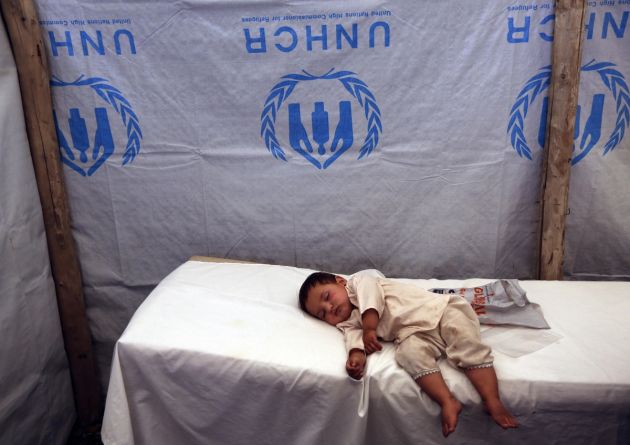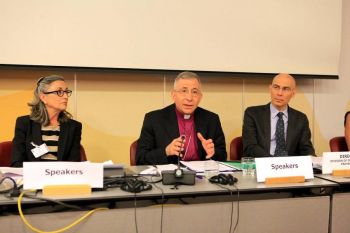Global refugees' tally shoots up, but faith groups work with UN refugee body

The number of refugees in the world is shooting up due to global conflicts with Syria's bloody war boosting those forced from their homes placing heavy demands on international and faith-based humanitarian groups.
A report released the day before World Refugee Day, on Wednesday by the UN refugee agency, shows that by the end of 2012, more than 45.2 million people were in situations of displacement, compared to 42.5 million at the end of 2011.
This is the highest level in 20 years and place massive demands on civil and faith-based agencies joining international organizations combating human displacement.

This includes 15.4 million refugees, 937,000 asylum seekers, and 28.8 million people forced to flee within the borders of their own countries. The report does not include the rise in those forced from their homes in Syria during the current year.
"These truly are alarming numbers. They reflect individual suffering on a huge scale and they reflect the difficulties of the international community in preventing conflicts and promoting timely solutions for them," said António Guterres, UN High Commissioner for Refugees and head of UNHCR.
The UN refugee agency and representatives of 25 faith-based Non-Governmental Organizations on June 12 unveiled a landmark declaration aimed at strengthening protection for the world's more than 40 million refugees, internally displaced, and stateless people.
The declaration, known as an Affirmation of Welcome, is the first to involve UNHCR and a spectrum of faith-based groups.
It sets out principles to guide faith leaders in providing welcoming environments for refugees and displaced people, and those without citizenship, including through promoting community understanding and tolerance, and combating xenophobia.
The idea for a joint declaration emerged from a meeting hosted by UN High Commissioner for Refugees António Guterres in Geneva in December 2012 with religious leaders and faith-based NGOs.
Taking place between February and April of this year, drafting of the Affirmation involved a coalition of leading faith-based organizations and academic institutions. The text draws upon principles and values of welcome shared by religions including Buddhism, Christianity, Hinduism, Islam and Judaism.
Among those presenting the Affirmation on June 12 in Geneva were UNHCR's director of international protection, Volker Türk; the president of the Lutheran World Federation Bishop Munib A. Younan, Rabbi Nava Hafetz of Rabbis for Human Rights in Israel, and Atallah Fitzgibbon of Islamic Relief Worldwide, as well as representatives of other faith-based organizations.
"This dialogue is important not only for the protection of refugees but also as a practical way of promoting interreligious cooperation and understanding. It focuses not inwardly on us, but outwardly on the vulnerable human being in need," Younan told the gathering.
"In December, when I raised the idea of a code of conduct for faith leaders, it was because I believe that we who are faith leaders also have a responsibility to be accountable for how we teach and preach and live out our faith.
"Religion must protect human rights and be a conscience to the state on protection. I am pleased to see how this idea has developed.
"I fully endorse the Affirmations for Faith Leaders, the 'Welcoming the Stranger' document that is being publicly launched today," said Younan, who is bishop of the Evangelical Lutheran Church in Jordan and the Holy Land (ELCJHL).
On June 20, to mark World Refugee Day, the faith-based NGO HIAS (Hebrew Immigrant Aid Society) will begin a year-long campaign to promote the Affirmation within the Jewish community around the world.
In November, the declaration will be launched formally at the King Abdullah International Centre for Interreligious and Intercultural Dialogue in Vienna, in a conference organized by Religions for Peace bringing together over 400 faith leaders from around the world.
Other organizations that have been involved include the office of the Archbishop of Canterbury, Rev. Justin Welby. Jesuit Refugee Service, the Oxford Centre for Hindu Studies, the University of Vienna Faculty of Roman Catholic Theology, the World Council of Churches, the World Evangelical Alliance and World Vision International.
"Welcoming the Strannger: Affirmations for Faith Leaders" is available in Arabic, English, French, Hebrew, Russian and Spanish.